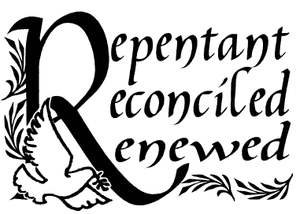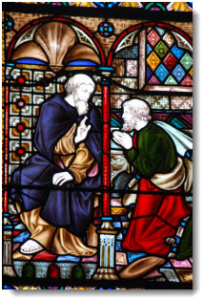Sacrament of Reconciliation

I said, “I will confess my transgressions to the LORD,” And you forgave the guilt for my sin.
Psalm 32:5

Reconciliation
“Adam, why did you eat that forbidden fruit?”
“It wasn’t my fault, God. Eve gave it to me.”
 It’s hard to admit the truth when you’ve’ done something wrong. And if you do, it’s hard to repent sincerely. “Sorry,” you mutter and then carry on as before, eager to forget the whole thing.
It’s hard to admit the truth when you’ve’ done something wrong. And if you do, it’s hard to repent sincerely. “Sorry,” you mutter and then carry on as before, eager to forget the whole thing.
It isn’t that easy. Saint Peter put his finger on why when he told one offender, “You did not lie to us but to God” (Acts 5:4). Though there are degrees of wrongdoing – everything from deliberately embracing evil to not-so-deliberate faults and weaknesses – every sin is an offense against God. Sin can separate us from God forever. At the very least, it diminishes our sharing in Christ’s life and damages our relationships with members of his body.
 The sacrament of Reconciliation helps us to take sin seriously. Any person-to-person admission of guilt can be an incentive to honesty. But when the person confess to Christ, there are no limits to the possibilities of conversion!
The sacrament of Reconciliation helps us to take sin seriously. Any person-to-person admission of guilt can be an incentive to honesty. But when the person confess to Christ, there are no limits to the possibilities of conversion!
 The Sacrament of Reconciliation is one of the most unique and beautiful aspects of Catholicism. Jesus Christ, in His abundant love and mercy, established the Sacrament of Confession, so that we as sinners can obtain forgiveness for our sins and reconcile with God and the Church. The sacrament “washes us clean,” and renews us in Christ.
The Sacrament of Reconciliation is one of the most unique and beautiful aspects of Catholicism. Jesus Christ, in His abundant love and mercy, established the Sacrament of Confession, so that we as sinners can obtain forgiveness for our sins and reconcile with God and the Church. The sacrament “washes us clean,” and renews us in Christ.
God alone can forgive sin. But on the evening of His resurrection, Jesus entrusted this power to His chosen representatives
 “Jesus said to them again, ‘Peace be with you. As the Father has sent me, even so I send you.’ And when he had said this, he breathed on them, and said to them, ‘Receive the Holy Spirit. If you forgive the sins of any, they are forgiven; if you retain the sins of any, they are retained’” (John 20:21-23).
“Jesus said to them again, ‘Peace be with you. As the Father has sent me, even so I send you.’ And when he had said this, he breathed on them, and said to them, ‘Receive the Holy Spirit. If you forgive the sins of any, they are forgiven; if you retain the sins of any, they are retained’” (John 20:21-23).
 Because the priest has received this power and is authorized to act as a special instrument of grace, what goes on in confessional is a meeting with Jesus. In the person of the priest, Jesus hears our admission of sin, receives our expression of sorrow, and extends our healing forgiveness.
Because the priest has received this power and is authorized to act as a special instrument of grace, what goes on in confessional is a meeting with Jesus. In the person of the priest, Jesus hears our admission of sin, receives our expression of sorrow, and extends our healing forgiveness.
 “I absolve you in the name of the Father, and of the Son, and the Holy Spirit.” What relief and freedom these words bring! And how happy are we who have Jesus’ assurance that our “transgression is forgiven,” and our “sin is covered”! (Psalm 32:1).
“I absolve you in the name of the Father, and of the Son, and the Holy Spirit.” What relief and freedom these words bring! And how happy are we who have Jesus’ assurance that our “transgression is forgiven,” and our “sin is covered”! (Psalm 32:1).

Prayer before Confession
Receive my confession, O most loving and gracious Lord Jesus Christ, only hope for the salvation of my soul. Grant to me true contrition of soul, so that day and night I may by penance make satisfaction for my many sins. Savior of the world, O good Jesus, Who gave Yourself to the death of the Cross to save sinners, look upon me, most wretched of all sinners; have pity on me, and give me the light to know my sins, true sorrow for them, and a firm purpose of never committing them again.
O gracious Virgin Mary, Immaculate Mother of Jesus, I implore you to obtain for me by your powerful intercession these graces from your Divine Son.
St. Joseph, pray for me.
A Guide for Confession
The essential requirement for a good confession is to have the intention of returning to God like the “prodigal son” and to acknowledge our sins with true sorrow before the priest.
Sin in my Life

Modern society has lost a sense of sin. As a Catholic follower of Christ, I must make an effort to recognize sin in my daily actions, words, and omissions.
The Gospels show how important is the forgiveness of our sins. Lives of saints prove that the person who grows in holiness has a stronger sense of sin, sorrow for sins, and a need for the Sacrament of Penance or Confession.
The Differences in Sins
As a result of Original Sin, human nature is weakened. Baptism, by imparting the life of Christ’s grace, takes away Original Sin and turns us back toward God. The consequences of this weakness and the inclination to evil persist, and we often commit personal or actual sin.
Actual Sin is a sin that people commit. There are two kinds of Actual sin, mortal and venial.
Mortal Sin is a deadly offense against God, so horrible that it destroys the life of grace in the soul.
Three simultaneous conditions must be fulfilled for a mortal sin:
1) the act must be something severe;
2) the person must have a sufficient understanding of what is being done;
3) the person must have sufficient freedom of the will.
Remember
If you need help, especially if you have been away for some time-simply ask the priest, and he will help you by “walking” you through the steps to make a good confession.
Before Confession
 Be truly sorry for your sins. The essential act of Penance, on the part of the penitent, is contrition, a clear and decisive rejection of the sin committed, together with a resolution not to commit it again, out of the love one has for God and which is reborn with repentance. The resolution to avoid committing these sins in the future (amendment) is a sure sign that your sorrow is genuine and authentic. This does not mean that a promise never to fall again into sin is necessary. A resolution to avoid the near occasions of sin suffices for true repentance. God’s grace in cooperation to rectify your life will give you the strength to resist and overcome temptation in the future.
Be truly sorry for your sins. The essential act of Penance, on the part of the penitent, is contrition, a clear and decisive rejection of the sin committed, together with a resolution not to commit it again, out of the love one has for God and which is reborn with repentance. The resolution to avoid committing these sins in the future (amendment) is a sure sign that your sorrow is genuine and authentic. This does not mean that a promise never to fall again into sin is necessary. A resolution to avoid the near occasions of sin suffices for true repentance. God’s grace in cooperation to rectify your life will give you the strength to resist and overcome temptation in the future.
Examination of Conscience
Before going to Confession you should make a review of mortal and venial sins since your last sacramental confession, and should express sorrow for sins, hatred for sins and a firm resolution not to sin again.
A helpful pattern for examination of conscience is to review the Commandments of God and the Precepts of the Church:
1 Have God and the pursuit of sanctity in Christ been the goal of my life? Have I denied my faith?
2 Have I placed my trust in false teachings or substitutes for God? Did I despair of God’s mercy?
3 Have I avoided the profane use of God’s name in my speech? Have I broken a solemn vow or promise?
4 Have I honored every Sunday by avoiding unnecessary work, celebrating the Mass (also holidays)?
5 Was I inattentive at, or unnecessarily late for Mass, or did I leave early? Have I neglected prayer for a long time?
6 Have I shown Christ like respect to parents, spouse, and family members, legitimate authorities?
7 Have I been attentive to the religious education and formation of my children?
8 Have I cared for the bodily health and safety of myself and all others? Did I abuse drugs or alcohol?
9 Have I supported in any way abortion, “mercy killing,” or suicide?
10 Was I impatient, angry, envious, proud, jealous, revengeful, lazy? Have I forgiven others?
11 Have I been just in my responsibilities to employer and employees? Have I discriminated against others because of race or other reasons?
12 Have I been chaste in thought and word? Have I used sex only within marriage and while open to procreating life? Have I given myself sexual gratification? Did I deliberately look at impure TV, pictures, reading?
13 Have I stolen anything from another, from my employer, from government? If so, am I ready to repay it? Did I fulfill my contracts? Did I rashly gamble, depriving my family of necessities?
14 Have I spoken ill of any other person? Have I always told the truth? Have I kept secrets and confidences?
15 Have I permitted sexual thoughts about someone to whom I am not married?
16 Have I desired what belongs to other people? Have I wished ill on another?
17 Have I been faithful to sacramental living (Holy Communion and Penance)?18 Have I helped make my parish community stronger and holier? Have I contributed to the support of the Church?
19 Have I done penance by abstaining and fasting on obligatory days? Have I fasted before receiving communion?
20 Have I been mindful of the poor? Do I accept God’s will for me?
During Confession
 After examining your conscience and telling God of your sorrow, go into the confessional. You may kneel at the screen or sit to talk face-to-face with the priest.
After examining your conscience and telling God of your sorrow, go into the confessional. You may kneel at the screen or sit to talk face-to-face with the priest.
Begin your confession with the sign of the cross, “In the name of the Father, and of the Son, and of the Holy Spirit. My last confession was _______ weeks (months, years) ago.”
The priest may read a passage from holy Scripture.
Say the sins that you remember. Start with the one(s) that is most difficult to say. (In order to make a good confession the faithful must confess all mortal sins, according to kind and number.) After confessing all the sins, you remember since your last good confession, you may conclude by saying, “I am sorry for these and all the sins of my past life.”
Listen to the words of the priest. He will assign you some penance. Doing the penance will diminish the temporal punishment due to sins already forgiven. When invited, express some prayer of sorrow or Act of Contrition such as:
An Act of Contrition
O my God, I am heartily sorry for having offended you and I detest all my sins, because I dread the loss of heaven and the pains of hell. But most of all because I have offended you, my God, who are all good and deserving of all my love. I firmly resolve with the help of your grace, to confess my sins, to do penance and to amend my life.
Amen.
At the End of Confession
Listen to the words of absolution, the sacramental forgiveness of the Church through the ordained priest.
As you listen to the words of forgiveness you may make the sign of the cross with the priest. If he closes by saying, “Give thanks to the Lord for He is good,” answer, “For His mercy endures forever.”
After Confession
Give thanks to God for forgiving you again. If you recall some serious sin you forgot to tell, rest assured that it has been forgiven with the others, but be sure to confess it in your next Confession.
Do your assigned Penance.
Resolve to return to the Sacrament of Reconciliation often. We Catholics are fortunate to have the Sacrament of Reconciliation. It is the ordinary way for us to have our sins forgiven. This sacrament is a powerful help to get rid of our weaknesses, grow in holiness, and lead a balanced and virtuous life.
What are some benefits of going to Confession?

1. Confession helps us to better “know thyself.”
St. Augustine and countless other saints and doctors of the Church talk about the importance of knowing ourselves well. Through coming to know ourselves better, we realized how fallen we are, and how badly we need God’s help and grace to get through life. Frequent Confession helps remind us to rely on God to help rid us of our sins.
2. Confession helps us overcome vice.
The grace we receive from the Sacrament of Confession helps us combat our faults and failings and break our habits of vice much more easily and expediently than we could otherwise do without the sacramental grace.
3. Confession brings us peace.
Guilt from the sins we commit can make us feel all mixed up inside and cause us to lose our peace and joy. When we hear God’s forgiving words to us from the lips of the priest in Confession, a burden is lifted off our shoulders and we can again feel the peace of heart and soul that comes from being in a good relationship with God.
4. Confession helps us become saintlier, more like Jesus.
Jesus was perfectly humble, perfectly generous, perfectly patient, perfectly loving—perfectly everything! Don’t you wish you could be as humble, generous, patient, and loving as Jesus? Saints throughout history have felt that way too, and they have frequented the Sacrament of Reconciliation to help transform them into people who are more like Christ. Little images of Christ—that’s what saints are!
5. Confession makes our will stronger.

Every time we experience the Sacrament of Confession, God strengthens our will and our self-control to be able to resist the temptations that confront us in our lives. We become more resolute to follow God’s will and not our own whims.
Of course, the list of benefits of the Sacrament of Confession goes on and on! But you have to go to reap the benefits! Going to Confession regularly will truly change your life.
The words of absolution in the Confessional are truly beautiful: “I absolve you from your sins, in the name of the Father and of the Son and of the Holy Spirit.” Jesus is waiting to forgive you—all you have to do is ask! Don’t miss out any longer on the healing power of Confession.
Why do Catholics confess their sins to a priest rather than going directly to God?

Well, the quick answer is because that’s the way God wants us to do it. In James 5:16, God, through Sacred Scripture, commands us to “confess our sins to one another.” Notice, Scripture does not say confess your sins straight to God and only to God…it says confess your sins to one another.
In Matthew, chapter 9, verse 6, Jesus tells us that He was given authority on earth to forgive sins. And then Scripture proceeds to tell us, in verse 8, that this authority was given to “men” …plural.
 In John 20, verses 21-23, what is the 1st thing Jesus says to the gathered disciples on the night of His resurrection? “Jesus said to them, ‘Peace be with you. As the Father has sent me, even so I send you.’” How did the Father send Jesus? Well, we just saw in Mt 9 that the Father sent Jesus with the authority on earth to forgive sins. Now, Jesus sends out His disciples as the Father has sent Him…so, what authority must Jesus be sending His disciples out with? The authority on earth to forgive sins. And, just in case they didn’t get it, verses 22-23 say this, “And when He had said this, He breathed on them, and said to them, ‘Receive the Holy Spirit. If you forgive the sins of any, they are forgiven; if you retain the sins of any, they are retained.’”
In John 20, verses 21-23, what is the 1st thing Jesus says to the gathered disciples on the night of His resurrection? “Jesus said to them, ‘Peace be with you. As the Father has sent me, even so I send you.’” How did the Father send Jesus? Well, we just saw in Mt 9 that the Father sent Jesus with the authority on earth to forgive sins. Now, Jesus sends out His disciples as the Father has sent Him…so, what authority must Jesus be sending His disciples out with? The authority on earth to forgive sins. And, just in case they didn’t get it, verses 22-23 say this, “And when He had said this, He breathed on them, and said to them, ‘Receive the Holy Spirit. If you forgive the sins of any, they are forgiven; if you retain the sins of any, they are retained.’”
Why would Jesus give the Apostles the power to forgive or to retain sins if He wasn’t expecting folks to confess their sins to them? And how could they forgive or retain sins if no one was confessing their sins to them?
The Bible tells us to confess our sins to one another. It also tells us that God gave men the authority on Earth to forgive sins. Jesus sends out His disciples with the authority on earth to forgive sins. When Catholics confess our sins to a priest, we are simply following the plan laid down by Jesus Christ. He forgives sins through the priest…it is God’s power, but He exercises that power through the ministry of the priest.
“It takes a lifetime to be a Christian, and takes our whole life to be one.”
– Meline Ngo
 Copyright secured by Digiprove © 2022 meline Ngo
Copyright secured by Digiprove © 2022 meline Ngo

Recent Comments